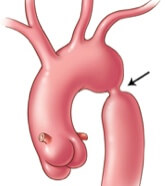Aortic coarctation is a narrowing in the main blood vessel of the body (the aorta). This is usually present since birth.

How common is it?
Aortic coarctation affects about 1 in 3000 of the population.
What symptoms might I get?
Some patients with aortic coarctation have no symptoms but some present in childhood with fatigue on effort or later in life with high blood pressure.
Will I need treatment?
This depends on the severity of the narrowing. If the narrowing is causing symptoms or affecting your blood pressure then options include stretching the narrowing with a balloon and stent or surgically correcting it. Blood pressure treatment is usually required.
What extra tests are required?
Patients with aortic coarctation usually require further imaging with a heart ultrasound (echocardiogram) to examine the heart function and aortic valve and computed tomography (CT) scan to look at the aorta wall in more detail. Some patients require cardiac catheterisation to measure the pressures within the blood vessels.
Is it hereditary?
Usually not.
Does this affect my life expectancy?
It can do if left untreated. If treated appropriately then most patients lead a normal life expectancy although lifelong monitoring of the condition may be required.
What happens next?
If you have been diagnosed with aortic coarctation then you can be referred to your local cardiologist for further investigation.
Useful links
http://en.wikipedia.org/wiki/Coarctation_of_the_aorta